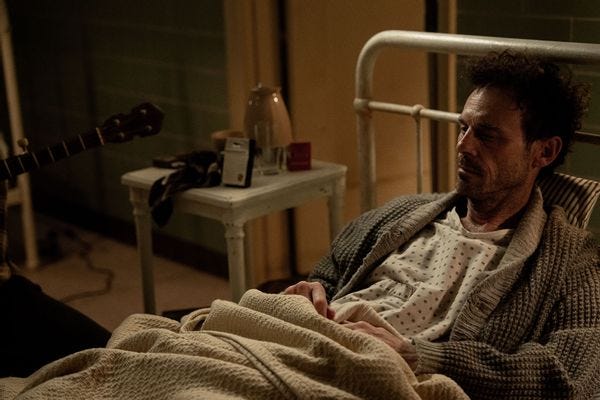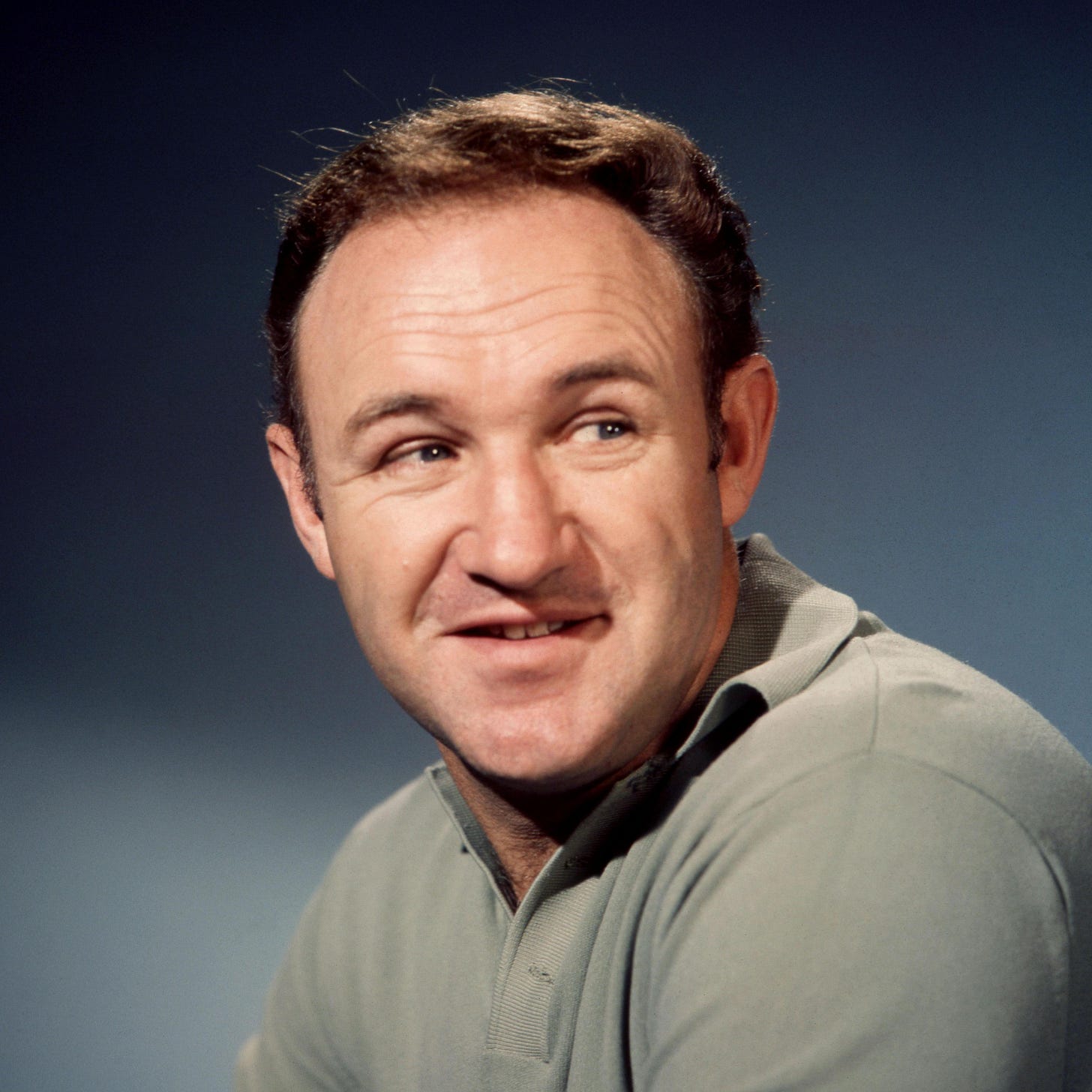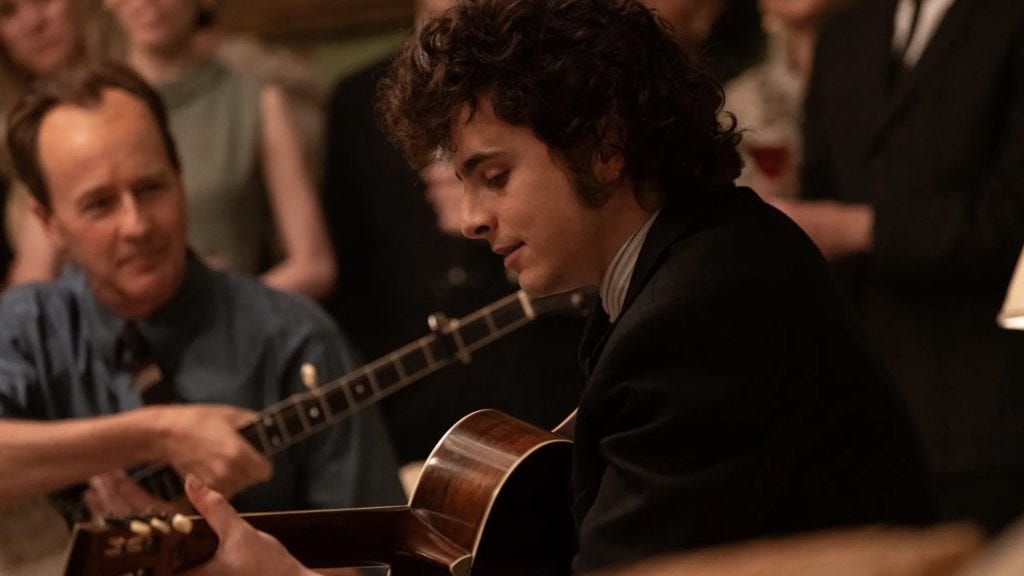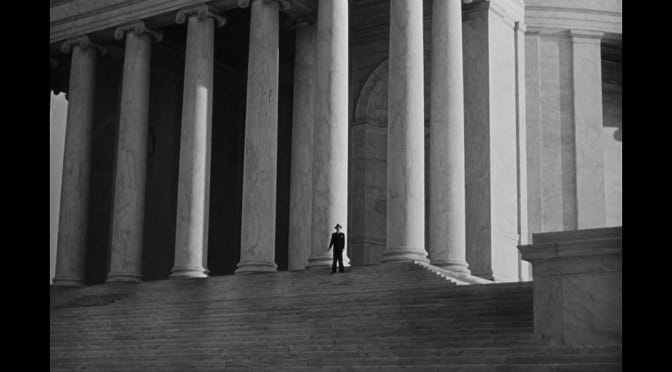Assorted Thoughts 03/03/25
Hello! This weeks edition of Assorted Thoughts is a little shorter than usual - I'm writing this on Friday because I'm out all of Saturday for a friend's birthday and I don't think I'll particularly be in a writing mood come Sunday. Going a different direction with this weeks iteration, writing about some more abstract concepts rather than two film reviews and a love letter like in last weeks edition. I'm still trying to find the right balance for this and I'm sure in a couple months Assorted Thoughts will be a consistently great piece once I've figured it out.
I'm talking about film again this week. I don't feel bad about this because the Oscars will take place approximately one hour after this piece's release, so it's the time of the year to only be talking about film, but this is first and foremost a newsletter about video games. I've got a lot of stuff in the works, but video games are an incredibly time consuming medium and writing about something in it's artistic infancy requires a lot of work and care. I've got two fun topics and one important topic lined up - this week we're talking about Timothee Chalamet, Gene Hackman and film discovery. I thought I would be writing *more* about these topics, but as it turns out I've condensed these pieces pretty well.
Thankyou again for reading Assorted Thoughts! I love doing these, and it's always nice to know people are actually reading what I put out. If you haven't already please do subscribe for free, it helps out a lot!!!
A word on Gene Hackman
It's very rare that when someone dies at the age of 95 that their death comes as a surprise. Hackman's death joins an ever-growing list of incredibly hurtful list of deaths from American film's greatest generation; it's something that makes you really reflect on the artists who are still with us and the time they have left. Guys who's best work is categorically behind them, who's legacy is starting to manifest itself in the new generation and who's memory is already being talked about.
Hackman really was one of those guys. A guy who transforms a film from watchable to must see, one who turns a classic to a touchstone and one who was almost selfless in his filmography. He worked with legendary directors; Clint Eastwood, Francis Ford-Coppola, Tony Scott, William Friedkin, Mike Nichols, David Mamet and Wes Anderson to name just a few. He worked on a couple of Superman films as Lex Luthor, he acted alongside names like Tom Cruise, Morgan Freeman, Al Pacino and John Cazale; he truly accomplished it all, leaving an artistic legacy that will simply never be matched again. When the idea of a great American actor comes to mind, Hackman is at the very top of an incredibly long list of great names.
The first film that comes to mind, and his all time greatest performance, comes from Francis Ford Coppola's The Conversation. In The Conversation, Hackman played the role of a professional surveillance-man who's descent into paranoia and madness could only be played by a man like Hackman. An incredibly cold film, Hackman perfectly nailed and floated into a fearful role that blossoms with that final cold image of Hackman in a torn up house playing the saxophone. The Conversation is an incredibly important film in both Hackman and Ford-Coppola's filmography; for Hackman it's his greatest work, but it also became potentially the greatest performance in any Ford-Coppola film. That is a crazy thing to say, because in the very same year that The Conversation released, The Godfather Part II also released and Al Pacino and Robert de Niro were delivering something masterful in the popular pick for Ford-Coppola's greatest film. Instead, nestled in a smaller film that stands out in comparison to FFC's other work in the 70's, Hackman delivered his personal magnum opus and one of the very best pieces of acting the world has seen.
I're reading this on the day this piece is intended to release, it'll be five days following Hackman's death. I really do recommend watching something with him in it this week, because he was such a transformative actor and his immense talent beams through practically anything he was apart of. If you've never seen The Conversation, it's my pick for anyone interested in watching a Hackman film, but I also recommend David Mamet's Heist which is effortlessly fun and great; Hackman is practically dancing around the screen in that one. Me personally? I think it's time to finally check out Jerry Schatzberg's Scarecrow or maybe even Clint Eastwood’s Absolute Power; it's going to be very hard to go wrong with anything I pick.
God I Hope Timmy Wins
Geez, the Oscars are really barren this year huh? I've seen six of the ten Oscar nominees this year and none of the one's I've seen rank anywhere in my top ten films of 2024 (Although I do have high hopes for Nickel Boys, which I should watch before the completion of the show.) The best director category is almost unsightly to look at and fucking Emilia Perez is nominated for *thirteen awards*. Last year's nominees weren't that great either (Barbie getting nominated for anything felt bad, Poor Things winning so much was nearly reprehensible) but there were some great pulls throughout, especially with a Glazer and Scorsese film nominated for Best Picture in the same year (I think in five years we're going to really be confused by Killers of the Flower Moon winning practically nothing.)
I decided I wanted to write about The Oscars last week after finishing the last edition of Assorted Thoughts and I could only really think about one thing I'm entirely passionate about in terms of this years show - I really want Timothee Chalamet to win Best Actor. The funniest thing is, I don't even think Timothee has the best performance in the Best Actor category, it is just unrelentingly clear that Sebastian Stan as Donald Trump has next to zero chance for winning the whole thing, so I may as well cheer for Timothee. Admittedly my reasons for wanting Timothee to win were mostly vibe-based, which as a critic makes it seem as though I have nothing to say, so I worked to unpack those vibes.
Timothee's Oscar campaign seemingly has been about how great of a guy he is. There's videos of him dancing in Paris having the time of his life, he's going on SNL and singing Bob Dylan songs and he's going on Nardwuar and having the time of his life. It feels like every other day we see a new tweet that says "I don't know, I just really like this guy!" This all culminated last week when at the SAG-Aftra Awards said that he "wanted to be one of the greats" and that he's inspired by Michael Jordan and Michael Phelps equally as much as Marlon Brando or Viola Davis. It's an awesome thing to hear from a working actor at the moment - in a time when it's easy to get let down by the state of cinema, dominated by franchises more so than great artistic works. Timothee on the other hand understands artistic greatness and is chasing it, it's just really endearing to hear.
I think it's clear that barring anything crazy, Timothee will probably win an Oscar at some point in his life - I think if it's not in A Complete Unknown it'll be in a Guadangnino film or I could even see him in a late Scorsese film - so why do I have an urgency to the point I really want Timothee to win right now? I contemplated this for a while, and I guess what I decided is that I actually really like Timothee's performance in A Complete Unknown. A Complete Unknown is not a film I like, I think it's writing gets in the way of itself constantly and it's refusal to play with the form of a biopic means that the whole thing comes across pretty flat and unimpressive. There are about fifty films like it released every year and all of them are directed in the exact same way that James Mangold chooses to direct a film.
I think Timothee's performance is the defining piece of A Complete Unknown in a really interesting way - I don't think anyone is doing anything particularly interesting acting wise outside of him (Which makes it really weird that Edward Norton was nominated for Best Supporting Actor IMO,) but that is usually how these biopic's turn out. I think a bad biopic, one that get accuses of being Oscar Bait, is often reprehensible, but there is a part of me that watches A Complete Unknown and wishes it was better. I wish someone who wasn't named James Mangold directed this, I wish that Bob Dylan was actually written like a tortured artist instead of just coming across as a condescending asshole, I wish it got *more* political; at the end of the day it's a fun enough opportunity to hang out with Bob Dylan and enjoy his music, but that's about it.
But hanging out with Bob Dylan in this film is a genuine blast, because Timothee is rocking it perfectly. He's slow and careful, enamoured with the artistic process and standing out as interesting in comparison to the washed out, stereotypically Biopic Acting School-like cast that surrounds him. His Bob Dylan impression is *so* endearing, to the point I've been playing back a few of the Timothee Chalamet Versions of the songs used in the film because he's really attached himself to Bob and his music in a really fun way. It's a film that made me finally want to listen to Bob Dylan, and that only happens because of Timothee.
While I feel at times the film fails to position Bob as a tortured artist, Timothee plays a very cold and mystifying role. This manifests at time as a complete asshole, but his detached manner and focus entirely on writing the music is well done. The film itself is focused on this great man idea like many biopics are but I think Timothee really sells the idea of Bob being just a bit of a loser.
It feels like all the failings are happening around Chalamet’s performance. It’s attempts at getting poetic often fall on top of itself - in it’s attempt to praise Bob Dylan as an artistic genius by having him see a side of a film that him and Sylvie Russo (Elle Fanning) go to see that she can’t, he comes across incredibly stupid. It’s mention again while those two characters say their parting words to eachother comes across painfully forced; it suffers from moments like this on a constant basis.
But in the end, Timothee's performance does get some material that it’s quality deserves. Every scene involving Woody Guthrie (Scoot McNairy), a dying man who Bob visits in hospital that leads to him meeting Pete Seeger (Edward Norton) has this ability to hold space that feels transcendent of the rest of the film. The quiet, mumbly performance of Timothee’s Bob Dylan serves to help this perfectly; at the end of the day we get to see Bob Dylan as a caring man for an inspiration, it’s entirely beautiful.

Is it one of the greatest acting performances of all time? No. Is it one of the best this year? If you're looking at the pool of Oscars nominees it absolutely is. It's better than Adrien Brody continuing to do what he has done for his whole career, it's better than Ralph Fiennes suffering from the exact same crisis of faith for the course of Conclave's runtime, and I haven't yet watched Sing Sing to give an opinion on Domingo's performance in Sing Sing. It's worse than Sebastian Stan in The Apprentice, but as I said before it's absolutely not going to win. If I ran my own personal awards show, Timothee would probably still find himself nominated. He'd be up against Nicolas Hoult in Juror #2, Mutsuo Yoshioka in Chime, Adam Driver in Ferrari and Sebastian Stan in The Apprentice, but getting nominated amongst those names is more than impressive.
I'd like to talk about my favourite 2024 films at another point. My watchlist is still too large to make anything definitive list; so once I've seen Trap, The Shrouds, Last Summer, A Different Man, Cloud, Serpent's Path (2024), Eephus, Henry Fonda For President, Oh Canada, Seed of the Sacred Fig, Queer, The Beast, By The Stream, Caught By The Tides, Here, Nickel Boys and Hard Truths, I'll get back to you all with my own list of favourites. Will A Complete Unknown rank anywhere near the top? Of course not, but at least Timothee's having a fun time.
Choosing A Director
Early in the week I put on Alfred Hitchcock's Strangers on a Train. I was looking for a director's filmography to dive into and I checked out Bronze Screen Dream's list of the Top 300 directors of all time. In first place over there they have Alfred Hitchcock, and with the Criterion Channel's collection of his films leaving the service at the end of February I thought it was high time to check out Just What I Was Missing. I don't know exactly why I chose Strangers on a Train first - I think I was expecting Hitchcock to base the whole movie inside a train although that wasn't the end result - but I ended up loving it anyway. The master of suspense is at his best here with some terrifying imagery, there are times when he has the camera fixed on Bruno Antony (Played by Robert Walker) that will stick in my mind forever.
Choosing to watch Hitchcock film's isn't an impressive endeavour really; he's one of the most accesible directors of all time for a reason but my own personal blindspot for his work made jumping into his large filmography a mammoth task. I also watched Vertigo in the past week and it's of course, a classic, I don't know why I wasn't expecting one of the best films I've ever watched, but Vertigo surprised me in a way that I couldn't expect for a film that has so much standing in film culture. I've been alive for 23 years and I *still* managed to not know a single thing that would happen in Vertigo, I hadn't even seen a single shot of it outside of Kim Novak preparing to jump into the water below the Golden Gate Bridge.
Discovery is in my mind, the greatest part of being into film in the year 2025. I'm pretty lucky in the sense that I have so many beautiful films I've never seen before and so many directors to choose from; decision paralysis is honestly such a useless thing to think about in regards to finding something because I can blindly throw a dart and find something life-changing. I haven't seen a film from the likes of Akira Kurosawa, Bergman, Truffaut, Jean-Luc Godard, John Ford, Howard Hawks, Robert Bresson and so many more. I'm excited about finally watching these filmmakers in equal parts because I'm so in love with the medium.
The directors I'm really diving into at the moment are David Lynch, the Coen Brothers, Hitchcock and Kiyoshi Kurosawa. I've got a few Scorsese's, Ford-Coppola's and PTA films left I want to watch, but those are more on the backfoot in comparison to the previously mentioned. I think diving into different directors filmographies is perhaps the best way to go about discovering film - before you know it you're suddenly more of a fan of Bringing Out The Dead than you are of The Departed, suddenly you like Tucker: The Man and His Dream more than The Godfather, it all becomes so easy to build your own personal taste. Choosing a director is the hard part, but film culture is structured well enough that it's not *that* hard - find some critics you love, watch films from the Sight and Sound Poll, watch directors that actors you like work with, watch films that directors you like are inspired by; there's simply so much to love.
I was thinking about this for a few reasons, but thinking about this sense of discovery and my love for it stemmed from my recent viewing of The Brutalist. After I saw it on Sunday and mostly didn't enjoy it because of the second half. My friend who gave me a free ticket said "I'm sorry to hear you didn't like it!" My parents said the same. I found it strange in a sense, because I felt there was nothing to be sorry about. We often talk about the joy of discovery when it comes to enjoying something - it's always beautiful to find something great - but the journey of discovery can only be great when you are subject to things you *don't* like. There is a beauty in enjoying not liking a film, I spent multiple paragraphs saying I loved A Complete Unknown despite hating A Complete Unknown - it's a film I despise yet I'm happy to have seen. For every wonderful Martin Scorsese movie I've watched, I'm almost bewildered when I watch something like Cape Fear and downright don't enjoy myself, it unlocks an understanding not only of Martin Scorsese films but also the medium of cinema as a whole. It's the same for games and music and any artform; it's the same for life!
There's a great Pauline Kael quote I always think of: "There is so much talk now about the art of the film that we may be in danger of forgetting that most of the movies we enjoy are not works of art ... Movies are so rarely great art, that if we cannot appreciate great trash, we have very little reason to be interested in them." What's the point of only watching the good stuff? How can we properly articulate how great Kiyoshi Kurosawa's Cure is without first having seen some downright awful films? How can I possibly exemplify the greatness of Clint Eastwood's Juror #2 when I look at it in comparison to another 2024 film like Anora? I can love Guan Hu's Black Dog, but I can also understand it's not *great art*.
Critique I believe is a pursuit of great art, and great art is only formed by the imperfect art that precedes it. When I think of The Brutalist or A Complete Unknown I first and foremost think of what endeared them to me. The mystery and steadfast path of The Brutalist's first half and Timothee Chalamet's excellent performance are excellent things to think about, they're fun to imagine in a better piece of art but I can only really appreciate them so much because of the surrounding context. If I want to understand film, the great acts that construct it and eventually create my own personal canon and write great critiques, I need to see films like A Complete Unknown and The Brutalist. I don't feel like I wasted my time because I overall didn't enjoy either film, it's quite the opposite in fact - I'm happy to have seen it no matter the quality, because there is always something to appreciate in there.
The other reason I was thinking about this was because of Video Games. That's right, here in my newsletter about Video Games, I'm actually going to talk about Video Games. Video Games suffer thanks to being in their artistic infancy; discovery is hard in video games not because it isn't possible, but great curation hasn't taken place. It's hard to find a list equivalent to Bronze Screen Dream's Top 300 directors, it's hard to find artistic influences, it's hard to find critics with their own appraisal of video games. That's mostly what Instructions Unclear is meant to be, a means to appraise video game history and a guide for those who want to appreciate video games on a more artistic level. Maybe one day we will have a video game equivalent of Sight and Sound, for now why don't we place the building blocks towards getting there.










